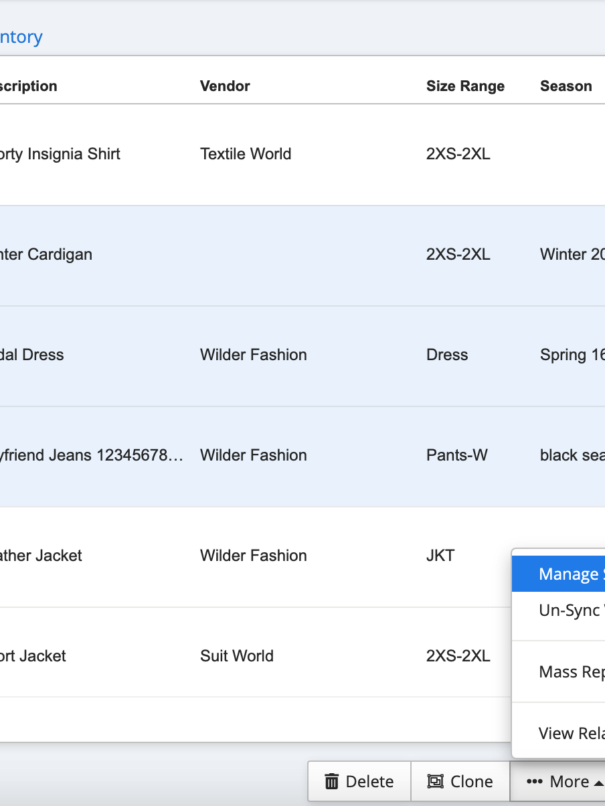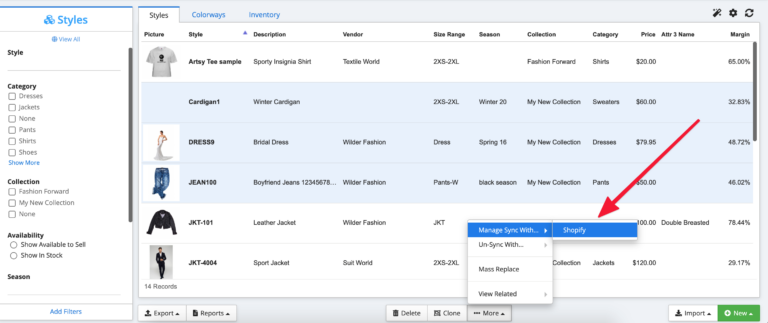A good enterprise resource planning (ERP) system can transform how your fashion business operates. And let’s not even discuss the ROI potential. But this doesn’t mean that the road is clear—certain challenges can arise. For some, these challenges can stand in the way of enjoying a great system that can take care of 100% of their back-end operations.
For others, there are just hurdles that need to be crossed in order to create a better process, which will inevitably increase productivity. If you are in this category, we have all the right solutions for all the questions when it comes to implementing an ERP system and the challenges that come with it.
A Slow and Confusing ERP Implementation Process
No plan means a no-go. Without looking at all aspects and perspectives, you cannot start implementing the software you have just procured. There are certain problems that can occur in such cases such as:
- Lack of Clear Objectives: Without a clear plan, you won’t have defined goals and objectives for what you want to achieve with the system. This can lead to a misalignment of expectations and outcomes.
- Poor Resource Allocation: Implementing an ERP system requires significant resources, including time, money, and personnel. Without a plan, you risk misallocating these resources, leading to delays and cost overruns.
- Resistance to Change: Implementing a new ERP system often requires changes in workflows and processes. Without a well-thought-out plan to manage change, employees may resist adopting the new system, leading to low user adoption rates.
Before you start, it’s a very good idea to hold a big meeting where you will present the new software. This will prepare both your managerial staff and employees for the couple of weeks that will be full of experimentation and learning the new system.
Inefficient Deployment
No matter how good the ERP system you have acquired is, if you don’t deploy it right, you might not even get to enjoy the features the software offers. This is why you need a leader who will look after the technical aspects of the software implementation.
Some vendors offer complete support and training to ensure a smooth launch. With that in mind, it might be in your best interest to find such a vendor and avoid the pitfalls that come when doing everything on your own.
Inadequate Testing
Before the ERP system can transform your business for the better, it must undergo rigorous testing.
The main reason for that is early detection of software bugs and glitches, which is important to avoid disruptions in business operations further down the line. It also checks compatibility with existing systems and workflows to ensure the transition does not disrupt ongoing processes.
Testing validates all functions of the systems and confirms a good ERP implementation. Then, businesses can confirm that the new system will meet their requirements. Additionally, it provides a practical training opportunity for end-users, helping them get accustomed to the system’s features and functionalities, thereby easing the transition and increasing user adoption rates. Also, performance assessment during testing is vital to ensure the ERP can handle the operational load of the business effectively.

Through comprehensive testing, companies can mitigate risks, reduce the likelihood of system failures, and ensure that the implementation smoothens rather than complicates business processes.
Proper Training
Proper training is a must for any new ERP system. If your staff isn’t trained well, they won’t use the system effectively, which can slow down business processes. A good training program should include varied learning methods to suit different learning styles and should be ongoing to cover system updates and new features.
Neglecting Success Metrics
To really understand if an ERP system is working, companies need to track its success through metrics. Without these metrics, it’s hard to know if the system is improving business operations or if it’s worth the investment. Companies should set clear goals and regularly check the system’s performance against these goals to ensure they are getting the most out of their ERP system.
How ApparelMagic Makes ERP Implementation Straightforward
For Complex Planning Requirements
ApparelMagic provides tailored implementation planning tools that help businesses map out their entire ERP journey, ensuring all critical elements are considered from the outset.
For Insufficient In-House Expertise
ApparelMagic offers comprehensive support and training, along with access to a network of experienced implementation consultants who can guide SMEs through the setup and customization process.
For Inefficient Data Management
The platform includes powerful data import tools that help businesses analyze and optimize their data before migration, ensuring only relevant and up-to-date information is transferred.
For Inadequate Testing
ApparelMagic provides a testing environment that allows businesses to thoroughly test the ERP under various scenarios, ensuring all potential issues are addressed before going live.
For Underestimating User Training Needs
ApparelMagic offers extensive training resources, including in-system tutorials, videos, and one-on-one consulting, to ensure users are proficient with the system.
For Neglecting Success Metrics
The software includes built-in analytics and reporting tools that enable businesses to track performance against their strategic goals, providing insights needed to adjust practices and maximize ROI.
The features you too can enjoy with ApparelMagic
- Advanced Planning and Customization: ApparelMagic enables precise customization and planning capabilities. Its features allow businesses to fine-tune every aspect of their operations, from custom fields and reports to line sheets and B2B pages, ensuring a seamless integration tailored to each brand’s unique needs.
- Robust Inventory and Order Management: The system offers comprehensive inventory management that keeps track of stock levels and movements with accuracy, ensuring that businesses can meet customer demands without the pitfalls of overstocking or understocking.
- Enhanced Customer Relationship Management: With built-in CRM capabilities, ApparelMagic provides real-time access to customer data, allowing for personalized service and targeted marketing that enhances customer satisfaction and loyalty.
- Efficient Supply Chain and Manufacturing Management: Our ERP solution facilitates efficient supply chain management by linking vendor purchase orders directly to customer orders and providing tools for detailed production tracking and vendor management. This ensures timely delivery of materials and products, enhancing overall supply chain responsiveness.
- Financial Management and Reporting: ApparelMagic includes a robust financial management module that automates and simplifies tasks such as invoicing, payroll, and tax calculations. It also provides real-time financial reporting, helping businesses make informed decisions quickly.
- Sustainability and Eco-Friendliness: Our ERP system supports sustainable business practices by aligning operations with sustainability goals, which is crucial for brands aiming to integrate an ethical narrative into their business model.
- Scalability and Cloud-Based Efficiency: ApparelMagic’s cloud-based ERP system is designed to scale your business, supporting growth without the need for significant additional investments. This scalability ensures that the ERP system adapts to expanding business needs over time.
If you want to be one of the businesses that are always one step ahead of the competition, enjoying the most customer interaction and taking care of every order without a hitch, schedule a call to learn more.
Wrapping Up
A successful ERP implementation project can indeed be challenging. From ensuring clear objectives and proper resource allocation to rigorous testing and comprehensive training, the path to successful integration is fraught with potential pitfalls. Thankfully, ApparelMagic makes the journey smoother and more manageable.
With its robust suite of tools designed for advanced planning, precise customization, and efficient inventory management, ApparelMagic addresses the unique needs of each brand. Its CRM capabilities enhance relationships, while its supply chain and manufacturing management tools ensure seamless operations. The platform’s financial management features simplify tasks and provide real-time insights, supporting informed decision-making. The cloud-based efficiency of the system further supports this scalability, adapting to the expanding needs of businesses over time.







